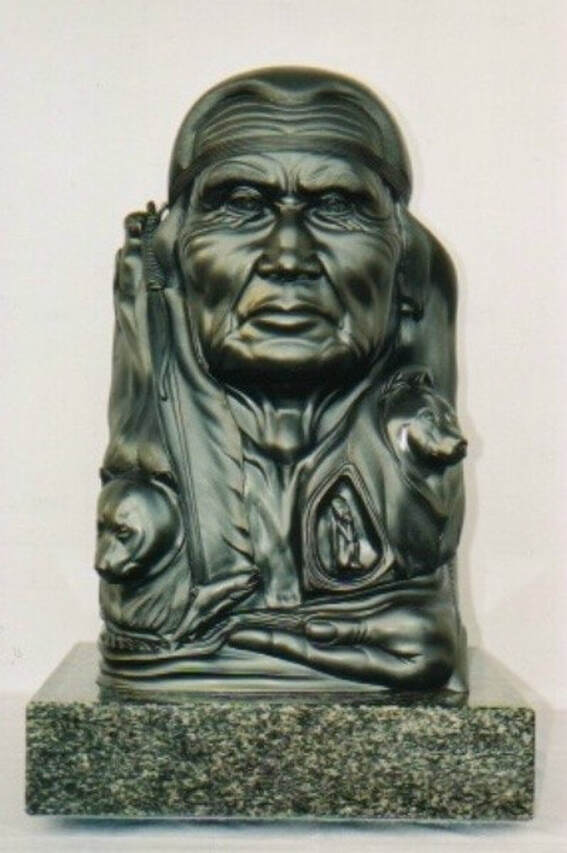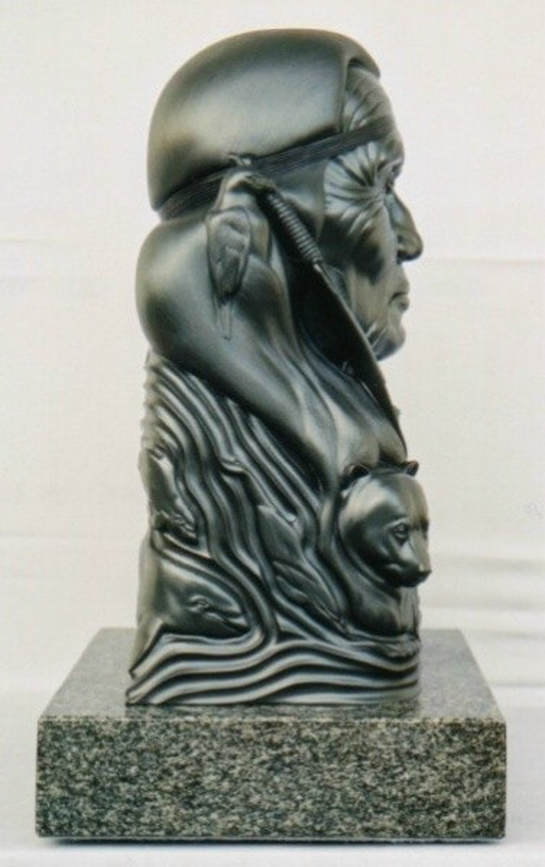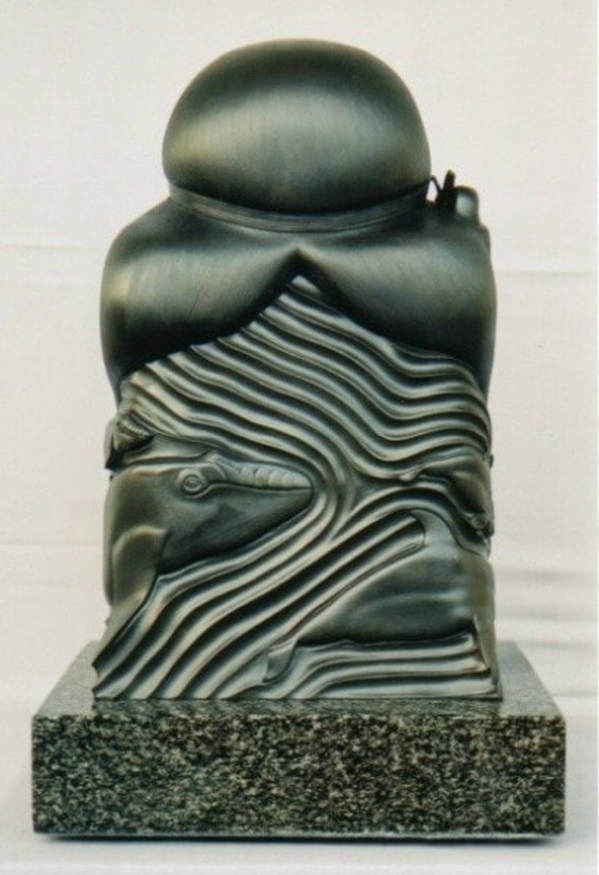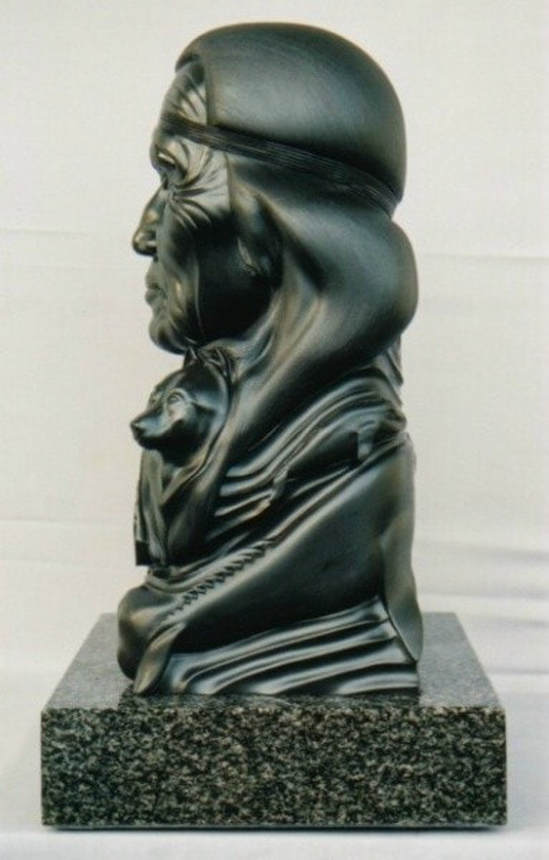This Stone Sculpture of Chief Dan George was purchased from me by the
Fraser River Fishing Lodge in Agassiz, B,C. and a few years later was generously donated to the Chief Dan George Middle School in Abbotsford B.C.
where it is permanently displayed.
Fraser River Fishing Lodge in Agassiz, B,C. and a few years later was generously donated to the Chief Dan George Middle School in Abbotsford B.C.
where it is permanently displayed.
Chief Dan George(July 24, 1899-Sept 23, 1981)
Chief Dan George was also known as: Geswanouth Slahoot
(means: Thunder coming up over the land from the water)
He was born son of the Chief of the Coast Salish Tribe in Vancouver, British Columbia, and given the native name of "Tes-wah-no", but known in English as Dan Slaholt. At the age of five, he was sent to a mission boarding school and was given the surname of "George". While there, he was forbidden to speak his native language. At the age of seventeen, he left the school and began a string of jobs that would eventually lead to his acting debut. In 1960 he was asked to try out for the role of the aging Indian, "Old Antoine", in the CBC series Cariboo Country. Soon critics were describing him as one of the "finest natural actors anywhere." Walt Disney studios adapted the series into a movie named "Smith". A critic wrote that Dan George as Old Antoine played the role to "ultimate perfection." This role paved the road to acting in other movies. He would not, however, play a role that demeaned his race.
Chief Dan George was over 60 when he became a movie actor. His many films included:
Americathon (1979) Harry and Tonto (1974)
Centennial (1978) Alien Thunder (1973)
The Outlaw Josey Wales (1976) Dan Candy's Law (1973)
Shadow of the Hawk (1976) Little Big Man (1970)
Bears and I (1974) Smith! (1969)
His performance in "Smith!" led to an invitation to be "Old Lodge Skins" in the 1970 movie, "Little Big Man". He was nominated for an Oscar as best supporting actor. His wife Amy died in 1971 as her husband prepared to go to Hollywood for the Oscar ceremonies. In 1971 he won the New York Film Critics Award and the National Society of Film Critics Award for his work in this film. He was also a notable stage actor, most prominently recognized for his role of the father in George Ryga's play, "The Ecstasy of Rita Joe".
He was an actual Chief of the Burrard tribe of the Tel-lal-watt section of the Coast Salish nation from 1951-1963.
As a result of his success and moment in the spotlight, he became spokesman for native people throughout North America. One of his first appearances as spokesman was in Vancouver for its Centennial celebration in 1967. It was there that he orated his much publicized "A Lament for Confederation". The message therein was a clear calling for tolerance, understanding and integration of native peoples.
Actor and publisher, both, Chief Dan George has written well-respected books: "My Heart Soars", 1974; "You Call Me Chief : Impressions of the Life of Chief Dan George", co-authored by Hilda Mortimer, 1981; "My Spirit Soars", Published post-humously, 1982
In 1972, at the age of 73, Chief Dan George was honoured with a Doctor of Laws degree from Simon Fraser University. The following year, he was further honored with a Doctor of Letters from the University of Brandon.
He lived almost his entire life on the reserve where he was born, until 1981, when he died from heart failure.
Chief Dan George was also known as: Geswanouth Slahoot
(means: Thunder coming up over the land from the water)
He was born son of the Chief of the Coast Salish Tribe in Vancouver, British Columbia, and given the native name of "Tes-wah-no", but known in English as Dan Slaholt. At the age of five, he was sent to a mission boarding school and was given the surname of "George". While there, he was forbidden to speak his native language. At the age of seventeen, he left the school and began a string of jobs that would eventually lead to his acting debut. In 1960 he was asked to try out for the role of the aging Indian, "Old Antoine", in the CBC series Cariboo Country. Soon critics were describing him as one of the "finest natural actors anywhere." Walt Disney studios adapted the series into a movie named "Smith". A critic wrote that Dan George as Old Antoine played the role to "ultimate perfection." This role paved the road to acting in other movies. He would not, however, play a role that demeaned his race.
Chief Dan George was over 60 when he became a movie actor. His many films included:
Americathon (1979) Harry and Tonto (1974)
Centennial (1978) Alien Thunder (1973)
The Outlaw Josey Wales (1976) Dan Candy's Law (1973)
Shadow of the Hawk (1976) Little Big Man (1970)
Bears and I (1974) Smith! (1969)
His performance in "Smith!" led to an invitation to be "Old Lodge Skins" in the 1970 movie, "Little Big Man". He was nominated for an Oscar as best supporting actor. His wife Amy died in 1971 as her husband prepared to go to Hollywood for the Oscar ceremonies. In 1971 he won the New York Film Critics Award and the National Society of Film Critics Award for his work in this film. He was also a notable stage actor, most prominently recognized for his role of the father in George Ryga's play, "The Ecstasy of Rita Joe".
He was an actual Chief of the Burrard tribe of the Tel-lal-watt section of the Coast Salish nation from 1951-1963.
As a result of his success and moment in the spotlight, he became spokesman for native people throughout North America. One of his first appearances as spokesman was in Vancouver for its Centennial celebration in 1967. It was there that he orated his much publicized "A Lament for Confederation". The message therein was a clear calling for tolerance, understanding and integration of native peoples.
Actor and publisher, both, Chief Dan George has written well-respected books: "My Heart Soars", 1974; "You Call Me Chief : Impressions of the Life of Chief Dan George", co-authored by Hilda Mortimer, 1981; "My Spirit Soars", Published post-humously, 1982
In 1972, at the age of 73, Chief Dan George was honoured with a Doctor of Laws degree from Simon Fraser University. The following year, he was further honored with a Doctor of Letters from the University of Brandon.
He lived almost his entire life on the reserve where he was born, until 1981, when he died from heart failure.



